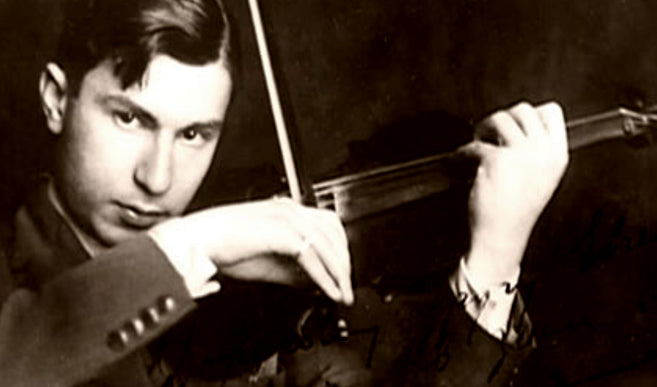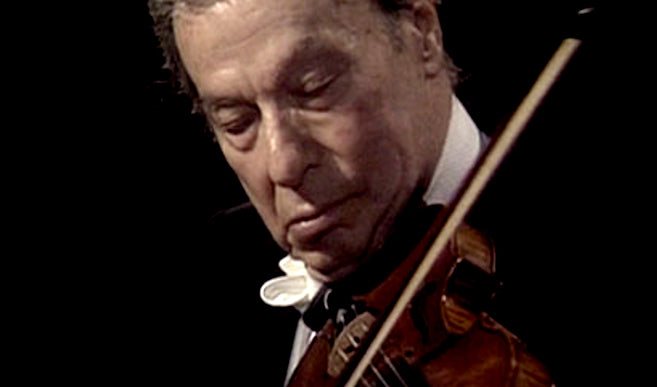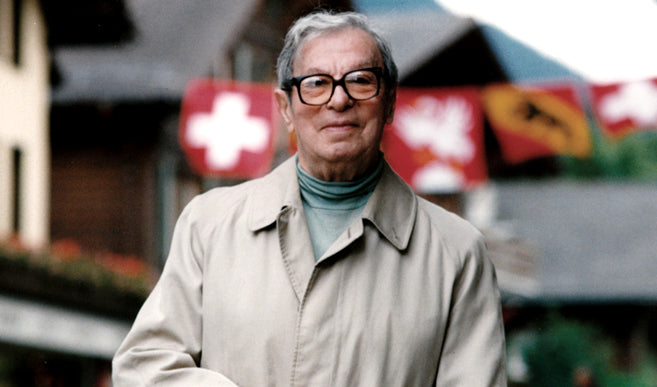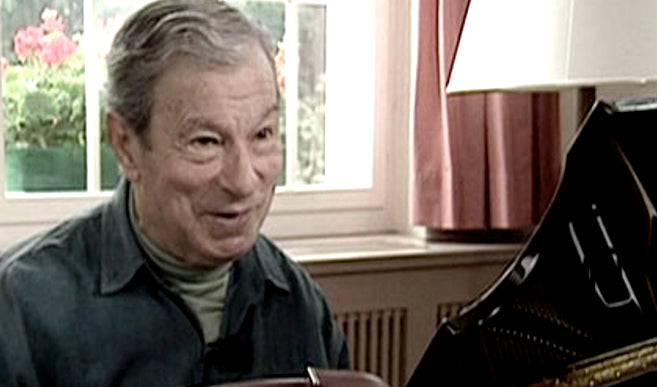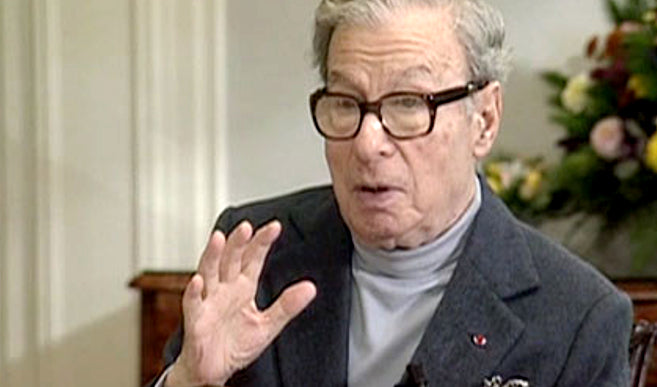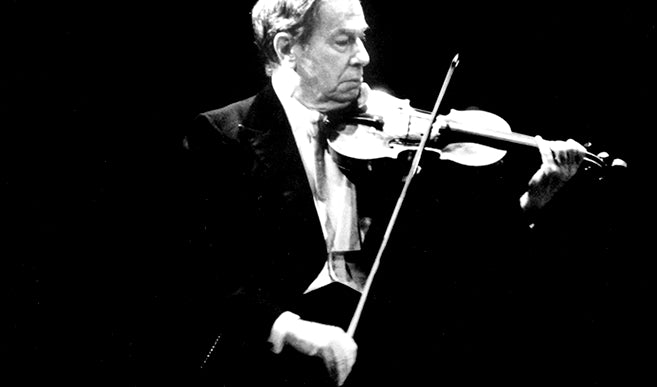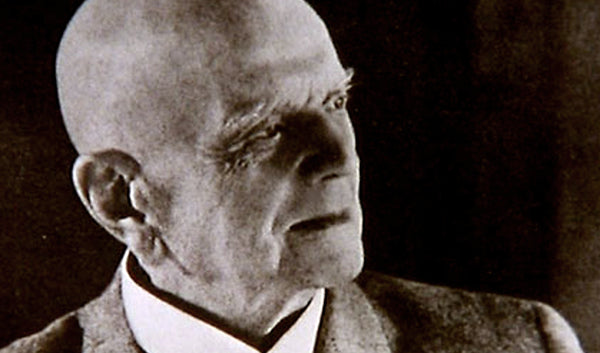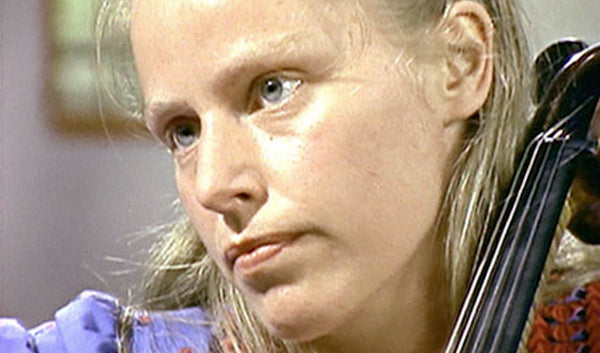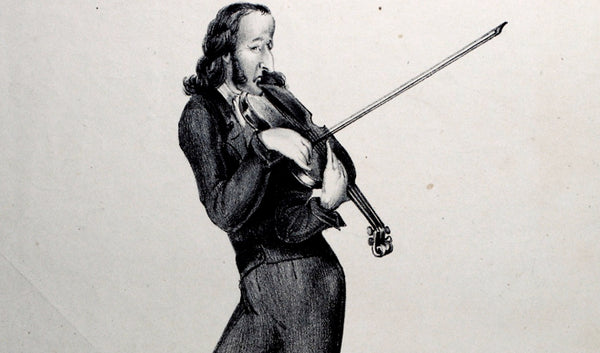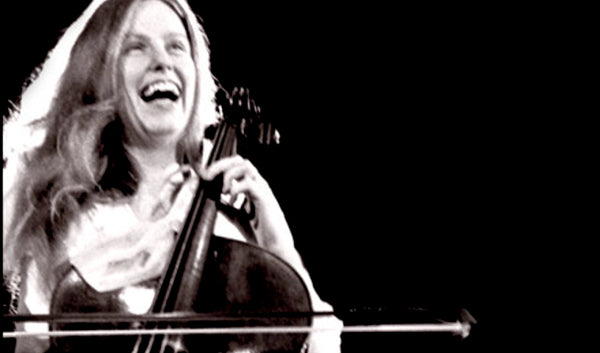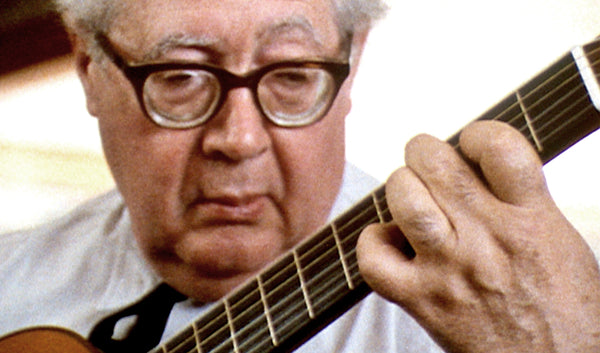This is a film in two parts with one of the finest performing musicians of the 20th century, an artist whose career spanned 73 years and who won the admiration and respect of virtually every international musician of his time and the genuine affection of most of them.
Why master of invention? Because Nathan Mironovich Milstein's ability to invent new ways of doing things on the violin constantly impressed musicians, critics and the public alike thoughout his career.
The most nearly perfect violinist of his time
Harold C Schonberg (The New York Times)
At the age of eleven Nathan Milstein astonished Leopold Auer and Jascha Heifetz at his first appearance in Auer's class in St Petersburg; it prompted Auer to ask his pupils, "Well, how do you like that Black Sea technique?" and the rumour went around that Auer was so stunned that he had fainted. Not a bad start for an eleven year old performer.
Less than a year later, he surprised Alexander Glazounov by inventing changes to Glazounov's violin concerto at a rehearsal with the composer himself conducting. Milstein recounts that Glazounov, peering over his moon glasses, enquired, "Don't you like what I did?" The young violinist instantly modified his playing to accord with the score, but after the rehearsal Glazounov generously invited him to play it his own way at the forthcoming concert.
It's not enough to practise. Obviously you have to practise, but you have to invent ways of doing better
Nathan Milstein
In the opening of the first of these two films, Nathan Milstein says to Pinchas Zukerman, "It's not enough to practise. Obviously you have to practise, but you have to invent ways of doing better". It is an impressive truth that right up to his last concert, at the age of 82, Nathan Milstein was constantly inventing ways of doing things better.
It is equally surprising and impressive that at the last concert, which provides a major part of both these films, he was constantly modifying the fingering to accommodate an ailing first finger on his left hand. That was only possible because all through his career he had been modifying fingerings, even during actual concerts, in order to keep the music alive - an astonishing feat - and the musical results in Stockholm, as fresh as ever, betrayed no ailing finger.
Related details
To these extraodinary facts I must add another. In sharp contrast to most international performers, Nathan Milstein so studiously avoided publicity throughout his career that he hardly ever appeared on television during all of those 73 years. As Pinchas Zukerman says in the film, during the Kennedy Center Honors Awards ceremony, "Everyone in our world treasures him because he refuses to make a fuss. He disdains fanfare and flattery. He is a man neither in need nor in awe of fame".
What better scenario for a portrait film? Film can do something to preserve the personalities of our great performers in a way that no other medium can equal. Audio recordings, books, radio and concerts may be able to do more for the art itself, but when it comes to remembering our artists, there is something that film can do to preserve the artistic persona which the others cannot match.
In this case, the result of our work is a two-part film in which this most professional, most modest and most honest of great musicians talks about his life, his career, his music and his friends, particularly about Auer, Glazounov, Rachmaninov, Horowitz and Piatigorsky. He also talks entertainingly about music to a younger friend and fellow violinist, Pinchas Zukerman.
The films try to capture one of Nathan Milstein's great virtues - the rare human condition of genuine simplicity which goes to the heart of things. In Nathan Milstein's case this quality is also allied to unforgettable talent, breathtaking skill and a true performing spirit.
DVD Extra features
This DVD contains both parts of our portait film, NATHAN MILSTEIN: MASTER OF INVENTION plus the whole of the Kreutzer Sonata with Georges Pludermacher at the piano and the whole of the Bach Chaconne.
Both of the latter works were filmed during Nathan Milstein’s last public recital in the Berwaldhallen in Stockholm on the 17th of July 1986 when Nathan Milstein was 82 years old and still playing as the grandest of Grand Masters.
This is a film in two parts with one of the finest performing musicians of the 20th century, an artist whose career spanned 73 years and who won the admiration and respect of virtually every international musician of his time and the genuine affection of most of them.
Why master of invention? Because Nathan Mironovich Milstein's ability to invent new ways of doing things on the violin constantly impressed musicians, critics and the public alike thoughout his career.
The most nearly perfect violinist of his time
Harold C Schonberg (The New York Times)
At the age of eleven Nathan Milstein astonished Leopold Auer and Jascha Heifetz at his first appearance in Auer's class in St Petersburg; it prompted Auer to ask his pupils, "Well, how do you like that Black Sea technique?" and the rumour went around that Auer was so stunned that he had fainted. Not a bad start for an eleven year old performer.
Less than a year later, he surprised Alexander Glazounov by inventing changes to Glazounov's violin concerto at a rehearsal with the composer himself conducting. Milstein recounts that Glazounov, peering over his moon glasses, enquired, "Don't you like what I did?" The young violinist instantly modified his playing to accord with the score, but after the rehearsal Glazounov generously invited him to play it his own way at the forthcoming concert.
It's not enough to practise. Obviously you have to practise, but you have to invent ways of doing better
Nathan Milstein
In the opening of the first of these two films, Nathan Milstein says to Pinchas Zukerman, "It's not enough to practise. Obviously you have to practise, but you have to invent ways of doing better". It is an impressive truth that right up to his last concert, at the age of 82, Nathan Milstein was constantly inventing ways of doing things better.
It is equally surprising and impressive that at the last concert, which provides a major part of both these films, he was constantly modifying the fingering to accommodate an ailing first finger on his left hand. That was only possible because all through his career he had been modifying fingerings, even during actual concerts, in order to keep the music alive - an astonishing feat - and the musical results in Stockholm, as fresh as ever, betrayed no ailing finger.
Related details
To these extraodinary facts I must add another. In sharp contrast to most international performers, Nathan Milstein so studiously avoided publicity throughout his career that he hardly ever appeared on television during all of those 73 years. As Pinchas Zukerman says in the film, during the Kennedy Center Honors Awards ceremony, "Everyone in our world treasures him because he refuses to make a fuss. He disdains fanfare and flattery. He is a man neither in need nor in awe of fame".
What better scenario for a portrait film? Film can do something to preserve the personalities of our great performers in a way that no other medium can equal. Audio recordings, books, radio and concerts may be able to do more for the art itself, but when it comes to remembering our artists, there is something that film can do to preserve the artistic persona which the others cannot match.
In this case, the result of our work is a two-part film in which this most professional, most modest and most honest of great musicians talks about his life, his career, his music and his friends, particularly about Auer, Glazounov, Rachmaninov, Horowitz and Piatigorsky. He also talks entertainingly about music to a younger friend and fellow violinist, Pinchas Zukerman.
The films try to capture one of Nathan Milstein's great virtues - the rare human condition of genuine simplicity which goes to the heart of things. In Nathan Milstein's case this quality is also allied to unforgettable talent, breathtaking skill and a true performing spirit.
DVD Extra features
This DVD contains both parts of our portait film, NATHAN MILSTEIN: MASTER OF INVENTION plus the whole of the Kreutzer Sonata with Georges Pludermacher at the piano and the whole of the Bach Chaconne.
Both of the latter works were filmed during Nathan Milstein’s last public recital in the Berwaldhallen in Stockholm on the 17th of July 1986 when Nathan Milstein was 82 years old and still playing as the grandest of Grand Masters.


